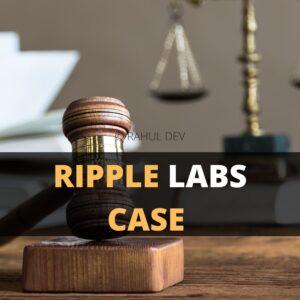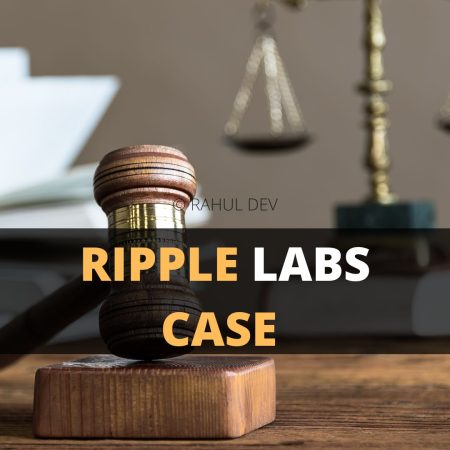Ripple Labs vs SEC Lawsuit
Explore the implications for the digital asset market

Regulatory Landscape Discussed
Understand the court's verdict on institutional sales, programmatic sales, and other distributions

Explore the implications for the digital asset market

Understand the court's verdict on institutional sales, programmatic sales, and other distributions

Protect your innovations across multiple countries and create strong patent portfolio to boost business valuation
Local and global brand protection through international trademark registrations
Extensive research and business writing for technical whitepapers and B2B content products
In the ever-evolving legal landscape of digital assets, the recent court decision in the case of the Securities and Exchange Commission (SEC) versus Ripple Labs, Inc. has emerged as a significant milestone. This landmark ruling has addressed some of the most pressing issues concerning the digital asset marketplace, setting a precedent for future cases.
This article covers following topics:
Ripple Case: Implications of the Decision
Ripple Labs Case Impact on Crypto Investors
Ripple’s Response to the Lawsuit

Ripple Labs, Inc., a prominent player in the digital asset exchange network, operates on the XRP Ledger blockchain. The crux of the case revolved around the nature of Ripple’s offers and sales of XRP tokens. The question was whether these transactions were securities subject to registration requirements under the Securities Act of 1933.
The court’s scrutiny was focused on three types of transactions in XRP undertaken by Ripple:
1. Direct sales to institutional buyers.
2. “Programmatic sales” conducted on secondary digital asset trading platforms.
3. Transfers to individuals and entities as compensation for services.
Ripple Labs Court’s Verdict: A Detailed Breakdown
The court’s decision on each of these transaction types has far-reaching implications:
Institutional Sales: The court ruled that Ripple’s sales to institutional buyers were “investment contracts” and thus, subject to registration requirements under the Securities Act. The court’s rationale was that the institutional investors had a reasonable expectation of profits derived from Ripple’s efforts.
Programmatic Sales: The court determined that programmatic sales on digital asset trading platforms did not constitute investment contracts subject to registration requirements. The court reasoned that these sales occurred on secondary trading platforms that match buyers and sellers without disclosing the identity of either, the buyers could not have known if their payments went to Ripple or another seller.
Other Distributions: The court ruled that the distribution of XRP tokens to employees or third parties for services did not constitute investment contracts subject to registration requirements. The court found that these transfers did not satisfy the “investment of money” prong of the Howey test because there was no evidence that the recipients of these distributions paid money or other consideration for the distributions.
This decision is the first judicial decision directly addressing whether digital asset transactions on secondary trading platforms constitute securities transactions. It may have broader implications in other digital asset related litigation, including recent enforcement actions brought by the SEC against large digital asset trading platforms. The court’s reasoning with respect to the Other Distributions could have implications for digital asset transactions that do not involve the direct tender of money by the buyers, such as air drops, protocol emissions, and other transactions.
However, it’s crucial to remember that this decision, while significant, is by only one district court judge. The views of other judges, districts, and circuits on these legal issues remain to be seen. These questions may not be considered settled until there are further judicial developments. The Ripple Labs case serves as a testament to the complexities and nuances of the digital asset marketplace. It underscores the need for clear understanding and interpretation of laws in this rapidly evolving sector. As we continue to navigate the digital asset landscape, this case will undoubtedly serve as a reference point for future discussions and decisions.
In the ever-evolving world of cryptocurrencies, investors are constantly seeking clarity and guidance on the regulatory landscape. One recent case that has captured the attention of the crypto community is the legal battle between Ripple Labs and the U.S. Securities and Exchange Commission (SEC). This high-stakes lawsuit has far-reaching implications for both Ripple and the broader cryptocurrency market. As investors eagerly await a resolution, the outcome of this case could potentially reshape the industry. In this article, we will delve into the details of the Ripple Labs case and explore its potential impact on crypto investors. From understanding the allegations made by the SEC to examining the potential consequences for the cryptocurrency market, we will provide you with the insights you need to navigate this complex and rapidly changing landscape. Whether you are a seasoned investor or just beginning your cryptocurrency journey, this article will equip you with the knowledge to make informed decisions in the face of uncertainty.
Ripple Labs, a San Francisco-based technology company, was founded in 2012 with the goal of revolutionizing cross-border payments using blockchain technology. Central to Ripple’s operations is its digital currency, XRP, which is used as a bridge currency for facilitating fast and low-cost international transactions. However, the SEC alleges that Ripple Labs conducted an unregistered securities offering by selling XRP to investors.
Ripple Labs has vehemently denied these allegations and has vowed to fight the SEC’s lawsuit. In response to the lawsuit, Ripple argues that XRP is not a security but rather a digital asset that serves a functional purpose within its payment network. Ripple contends that XRP’s utility as a medium of exchange and its independence from Ripple Labs should classify it differently from traditional securities. This distinction is crucial because if XRP is deemed a security, Ripple may be subject to significant fines and penalties.
Despite the legal battle, Ripple has continued to forge partnerships with financial institutions and expand its global network. This ongoing growth demonstrates the confidence that many investors have in Ripple’s technology and its potential to transform the financial industry.
To fully grasp the implications of the Ripple Labs case, it is essential to understand the relationship between Ripple and XRP. Ripple Labs created XRP as a digital asset that can be used to facilitate instant and low-cost cross-border transactions. Unlike Bitcoin and Ethereum, which are decentralized cryptocurrencies, XRP is controlled by Ripple Labs. This centralized control has raised concerns among regulators, who argue that Ripple has too much influence over XRP’s value and distribution.
Ripple’s payment network, RippleNet, utilizes XRP as a bridge currency to facilitate liquidity between different fiat currencies. This means that when a payment needs to be made from one currency to another, XRP is used as an intermediary, reducing the need for multiple currency conversions. This functionality has attracted the attention of major financial institutions looking to streamline their cross-border payment processes.
The legal battle between Ripple Labs and the SEC centers around whether XRP should be classified as a security. The SEC alleges that Ripple Labs conducted an unregistered securities offering by selling XRP to investors, arguing that XRP should be subject to the same regulations as traditional securities. If the court agrees with the SEC’s position, Ripple could face significant fines and penalties, and the broader cryptocurrency market could experience increased scrutiny from regulators.
On the other hand, Ripple Labs argues that XRP is fundamentally different from traditional securities and should be classified as a digital asset. Ripple contends that XRP’s primary purpose is to facilitate fast and low-cost transactions on its payment network, rather than serving as an investment vehicle. Ripple also emphasizes that XRP’s value is not solely dependent on the efforts of Ripple Labs but rather influenced by market forces.
The outcome of this legal battle could have far-reaching consequences for the entire cryptocurrency industry. If the court rules in favor of Ripple Labs, it could set a precedent for other cryptocurrencies that have faced similar regulatory challenges. Conversely, if the court sides with the SEC, it may lead to increased regulation and scrutiny for digital assets, potentially dampening investor enthusiasm.
The outcome of the Ripple Labs case holds significant implications for crypto investors. If XRP is deemed a security, there could be a ripple effect throughout the cryptocurrency market. Regulatory scrutiny may increase, leading to stricter compliance requirements and potentially limiting the growth potential of certain cryptocurrencies. Investors in XRP should closely monitor the progress of the lawsuit and consider the potential consequences. If the court rules in favor of Ripple Labs, it could result in renewed investor confidence and a potential surge in XRP’s value. However, if the court rules against Ripple Labs, it could lead to a decline in XRP’s value and increased uncertainty surrounding the regulatory landscape.
Beyond XRP, the Ripple Labs case highlights the importance of regulatory compliance in the cryptocurrency industry. As the market continues to evolve, investors should stay informed about regulatory developments and ensure that their investments align with applicable laws and regulations. Working with reputable exchanges and platforms that prioritize compliance can help mitigate risks and protect investors’ interests.
In conclusion, the Ripple Labs case has brought to the forefront the regulatory challenges faced by cryptocurrencies. The outcome of this legal battle could have profound implications for Ripple, XRP, and the broader cryptocurrency market. Investors should stay vigilant, educate themselves on the evolving regulatory landscape, and make informed decisions based on the outcome of the case. By staying informed and adapting to regulatory changes, investors can navigate the complex world of cryptocurrencies with confidence and clarity.

As a business coach and thought leader, I cannot emphasize enough the importance of innovation, new software patents, mobile apps, and patents for tech companies, startups, and entrepreneurs. The world is rapidly evolving, and staying ahead of the curve is vital for success. Embracing technological advancements such as blockchain and AI can unlock unprecedented opportunities, streamline operations, and propel businesses into the future with competitive valuation via intangible assets.
Click Here for AI Startup Valuation Guide.
For instance, blockchain technology can revolutionize supply chain management and secure data sharing wherein innovative business models are explained to the audience via technical whitepapers, while AI can automate and optimize decision-making processes. Mobile apps are no longer just a luxury; they have become essential tools for engaging customers and offering personalized experiences. Furthermore, securing digital innovation patents is crucial for protecting intellectual property, fostering innovation, and maintaining a competitive edge. By investing in these areas, businesses can position themselves as industry pioneers and pave the way for a prosperous future after thoroughly conducting the due diligence and reviewing the legal opinion letters, which in case of digital assets can assist in determining the tokens as utility assets or coins as utility tokens before listing the assets at an exchange.
Our team of advanced patent attorneys assists clients with patent searches, drafting patent applications, and patent (intellectual property) agreements, including licensing and non-disclosure agreements. Advocate Rahul Dev is a Patent Attorney & International Business Lawyer practicing Technology, Intellectual Property & Corporate Laws. He is reachable at rd (at) patentbusinesslawyer (dot) com & @rdpatentlawyer on Twitter.
Quoted in and contributed to 50+ national & international publications (Bloomberg, FirstPost, SwissInfo, Outlook Money, Yahoo News, Times of India, Economic Times, Business Standard, Quartz, Global Legal Post, International Bar Association, LawAsia, BioSpectrum Asia, Digital News Asia, e27, Leaders Speak, Entrepreneur India, VCCircle, AutoTech).
Regularly invited to speak at international & national platforms (conferences, TV channels, seminars, corporate trainings, government workshops) on technology, patents, business strategy, legal developments, leadership & management.
Working closely with patent attorneys along with international law firms with significant experience with lawyers in Asia Pacific providing services to clients in US and Europe. Flagship services include international patent and trademark filings, patent services in India and global patent consulting services.
Global Blockchain Lawyers (www.GlobalBlockchainLawyers.com) is a digital platform to discuss legal issues, latest technology and legal developments, and applicable laws in the dynamic field of Digital Currency, Blockchain, Bitcoin, Cryptocurrency and raising capital through the sale of tokens or coins (ICO or Initial Coin Offerings).
Blockchain ecosystem in India is evolving at a rapid pace and a proactive legal approach is required by blockchain lawyers in India to understand the complex nature of applicable laws and regulations.